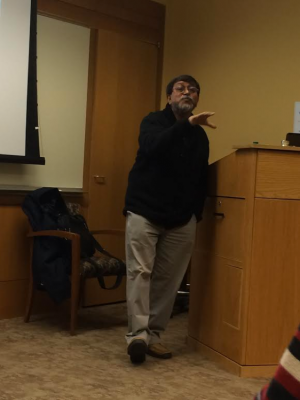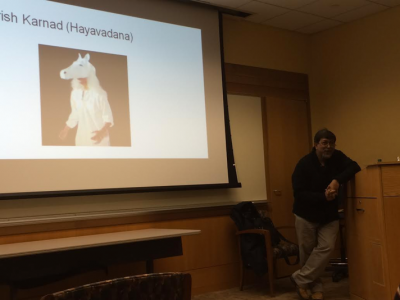Dr. Sonjoy Dutta-Roy Presents on Folk Theater in India
On March 23rd Professor of English at the University of Allahabad – and father of PhD candidate Arnab Roy of LCL’s Comparitive Literature section – Dr. Sonjoy Dutta-Roy gave a presentation at Babbidge Library’s Class of 1947 Conference Room on the spirit of disruption in folk theater forms of India. The goal of Dr. Dutta-Roy’s talk was decidedly non-encyclopedic. The speaker chose to embrace a performative mode of expression, weaving a narrative of recent Indian folk theater using specific examples from the country’s ritual tradition and their links to experimental theatric forms of past decades. Dutta-Roy structured his discussion on metaphorical grounds borrowed from the Nāṭya Śāstra, the ancient Indian treatise on performative arts, in which he identified two  crucial disruptions in the development of theatrical production in India. Theater being the primary vehicle for the percolation of vedic knowledge from higher to lower classes, these disruptions are endowed with great significance. The first disruption occurred, Dr. Dutta-Roy explained, when upper-caste participants of traditional fertility festivities decided to banish lower-caste and tribal people – refferred to as “demons” – from the performative spaces where ritual theater was performed. These “demons” were blamed for subtle disturbances in the performances, such as causing actors to forget their lines, and were thus denied access to newly ordained protective spaces where the previously open-air productions would take place. The second disruption detailed by Dutta-Roy had the opposite effect, when the high castes determined that the theatrical arts contaminated the purity of their people and ejected performers from their midst. Theater was then cast back out into the public sphere of the lower classes, setting the stage for later social and political controversies still in play today. According to Dr. Dutta-Roy, contemporary experimental theater in India continues to enact the legacy of these two disruptions in new and thought provoking ways.
crucial disruptions in the development of theatrical production in India. Theater being the primary vehicle for the percolation of vedic knowledge from higher to lower classes, these disruptions are endowed with great significance. The first disruption occurred, Dr. Dutta-Roy explained, when upper-caste participants of traditional fertility festivities decided to banish lower-caste and tribal people – refferred to as “demons” – from the performative spaces where ritual theater was performed. These “demons” were blamed for subtle disturbances in the performances, such as causing actors to forget their lines, and were thus denied access to newly ordained protective spaces where the previously open-air productions would take place. The second disruption detailed by Dutta-Roy had the opposite effect, when the high castes determined that the theatrical arts contaminated the purity of their people and ejected performers from their midst. Theater was then cast back out into the public sphere of the lower classes, setting the stage for later social and political controversies still in play today. According to Dr. Dutta-Roy, contemporary experimental theater in India continues to enact the legacy of these two disruptions in new and thought provoking ways.
